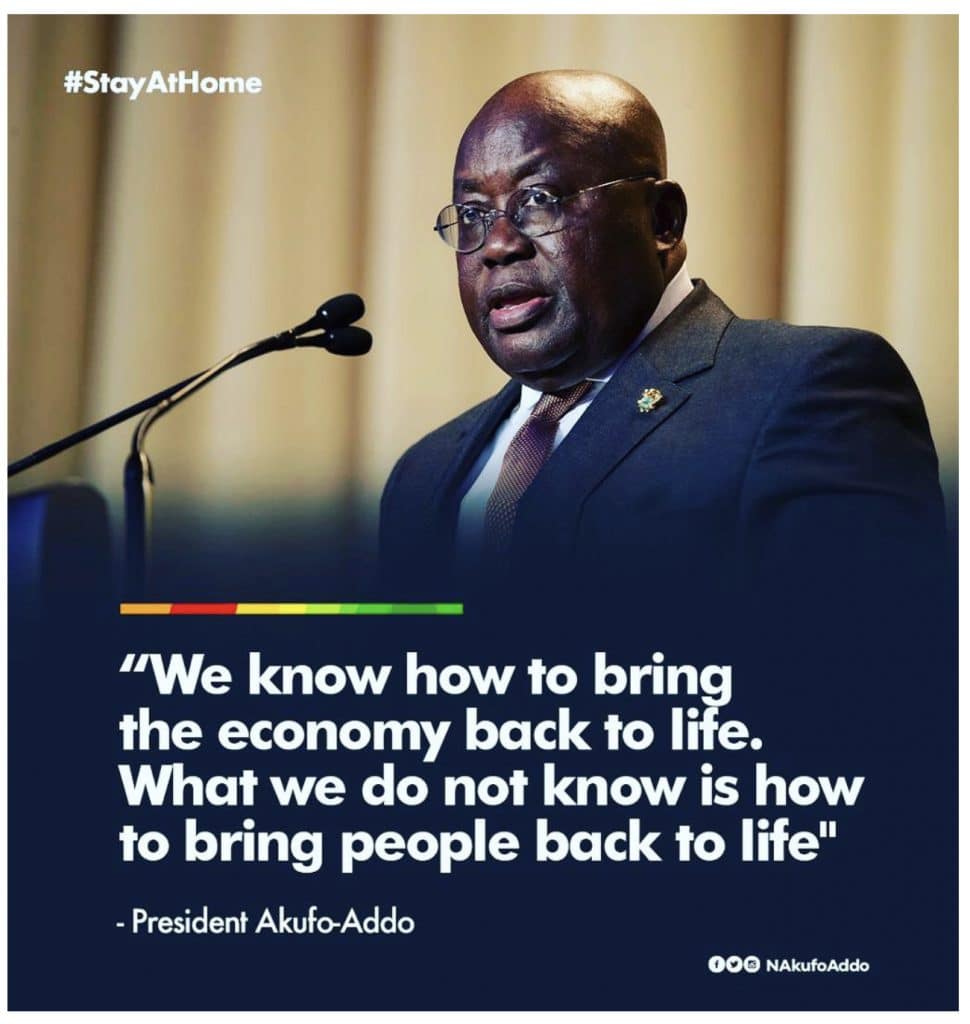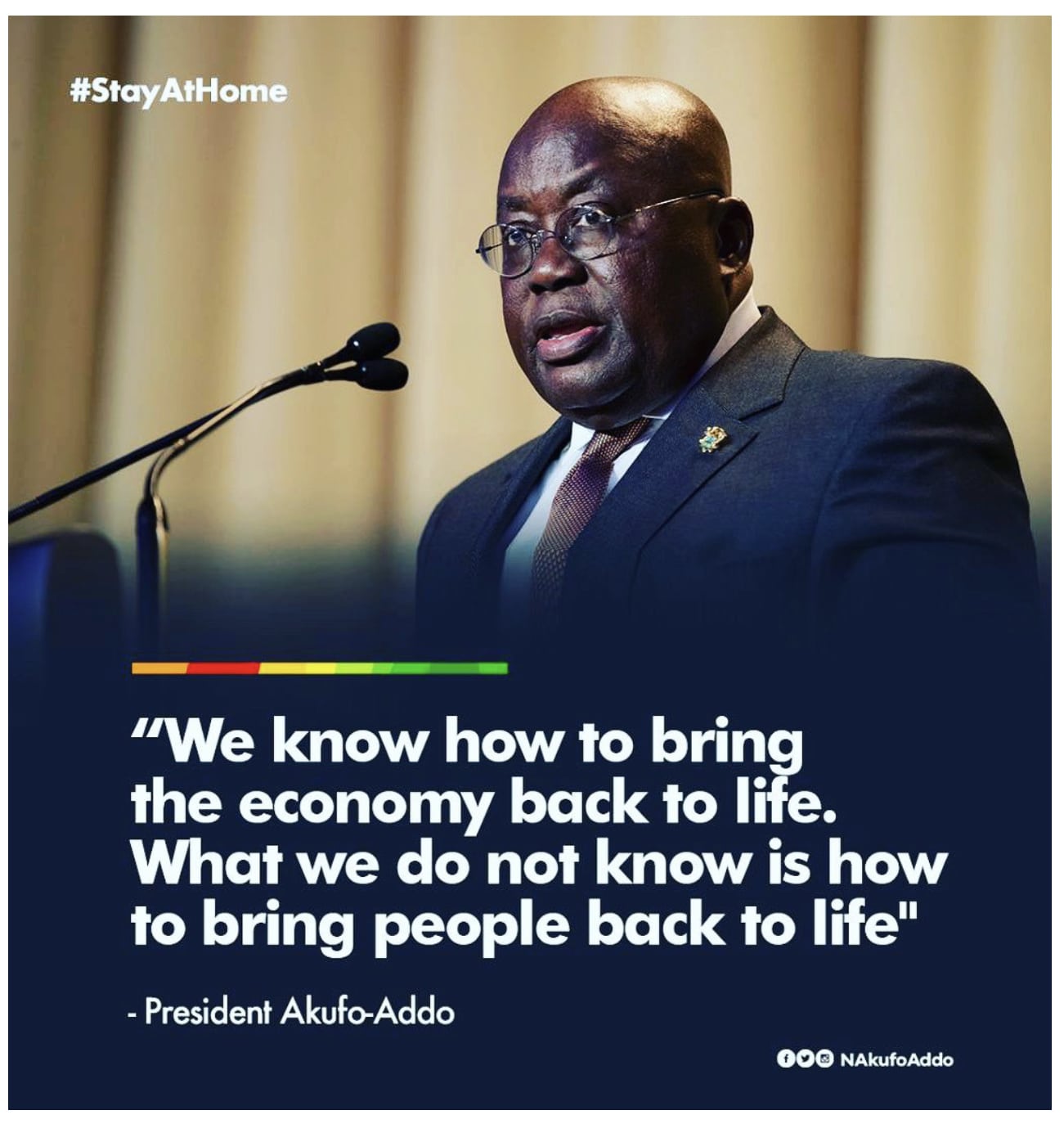On 12 January 2020, the World Health Organization (WHO) confirmed that a novel coronavirus was the cause of a respiratory illness in a cluster of people in Wuhan City, Hubei Province, China, which was reported to the WHO on 31 December 2019. The virus slowly found its way past the borders of the Republic of Ghana and settled among its citizenry. Many activities have slowly come to a halt and words like social distancing, quarantine and isolation have become household names. The global pandemic has coerced world leaders to make rapid decisions to ameliorate its effect in their countries and the world as a whole. So far, West African countries such as Ghana, Ivory Coast, Nigeria and Togo have really managed the situation well. As at 28th March 2020, Ghana had recorded 141 cases with five deaths. On 15 March, at 10 pm, President Nana Akufo-Addo banned all public gatherings including conferences, workshops, funerals, festivals, political rallies, church activities and other related events to reduce the spread of COVID-19.

Basic schools, senior high schools and universities, both public and private, have also been closed. There is a ban on social gatherings and lockdown in the two major regions in Ghana, Ashanti and Greater Accra. Political activities have also been impacted. So far, Ghana has been commended by WHO for its effective management of the situation unlike the UK where few early pragmatic measures such as tracking and tracing seems to have been implemented to control the spread of the virus. This is what Ernest Mbawini, a Ghanaian international student in the UK had to say “The COVID-19 has affected me in so many ways, I feel lonely and worried due to the outrageous figures of COVID-19 cases in the UK but I think my family is safe in Ghana because, the government’s contact tracing and quick response to the situation is very helpful” .
With very few months to the general elections, most political parties had scheduled their campaign activities from the middle of March to November, 2020. The setback of the virus has impeded the plans of the ruling New Patriotic Party to embark on their parliamentary and presidential primaries. Electorates all over the country have also expressed doubt on the rapid eradication of the deadly pandemic and envisaged safety over long queues to cast their ballot. Information available suggests that the electoral commission of Ghana is not prepared to do postal or electronic voting. In an interview with a Ghanaian resident in the UK, Marcia Abdul, she said “I voted in the 2016 elections, but this pandemic might affect all Ghanaians abroad like myself who really have plans to go back home to vote in December 2020”.
Coronavirus has been a bane to the fruition of electoral and political activities in Ghana. As a result of the virus, major political events have been suspended till further notice in adherence to the ban on social gatherings. On Tuesday April 14, 2020, Mr John Boadu, General Secretary of the New Patriotic Party said the decision to suspend the primaries was taken by the party at a National Steering Committee meeting, to conform with the President’s ban on social gatherings. Prior to the Government’s decision to close all borders and impose restrictions on public gatherings , there was a deep concern about the capacity of the Electoral Commission (EC) of Ghana to complete compilation of a new voter register in time for the December 2020 presidential and parliamentary elections. As some experts predict that it will take a year for normal life to resume, the EC announced that it is postponing the registration exercise indefinitely. The outbreak has thereby hampered the registration of new voters and disrupted scheduled electoral processes. The national identification card is purported to be a direct replacement for the voters’ ID card and a source of national identification after its full registration exercise is completed across the sixteen regions of Ghana.
Legislative activities have come to a standstill with some members of Parliament giving tangible reasons for missing parliamentary proceedings as a result of the adverse nature of the virus. On April 4, 2020, the Speaker of Parliament told the House, “I inform you with, with deep regret that I have received a letter, a castigating letter, from Hon. Sam George, MP for Ningo-Prampram Constituency, which says he cannot attend on this House again because sittings of this House are just a waste of his time as the sittings at this time are only to approve loans”.
At the backdrop of these sensitive situations, will political activities ever see its full capacity in the year 2020? Will political leaders come to a consensus on the next line of action in the run up to the 2020 general actions? What are the provisions outlined in the constitution? This and many questions have been asked as a result of the adverse effect of the COVID-19 outbreak on political activities in Ghana.
APPIAH OFOSU PRINCE













Great work done